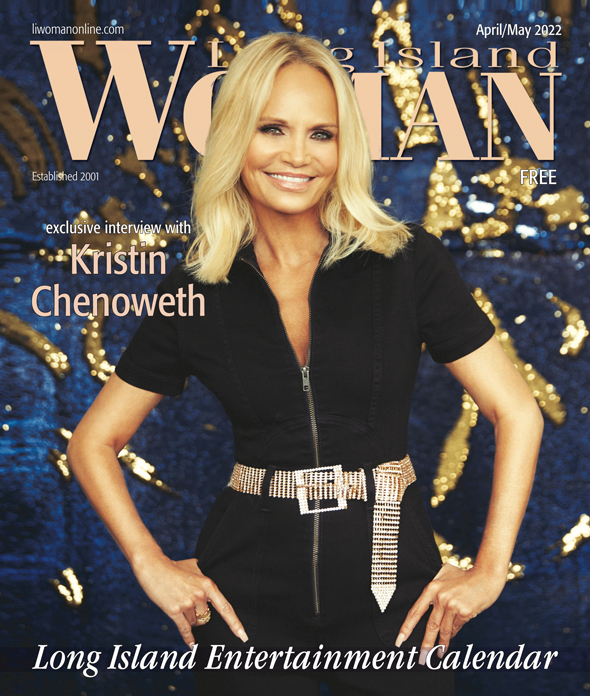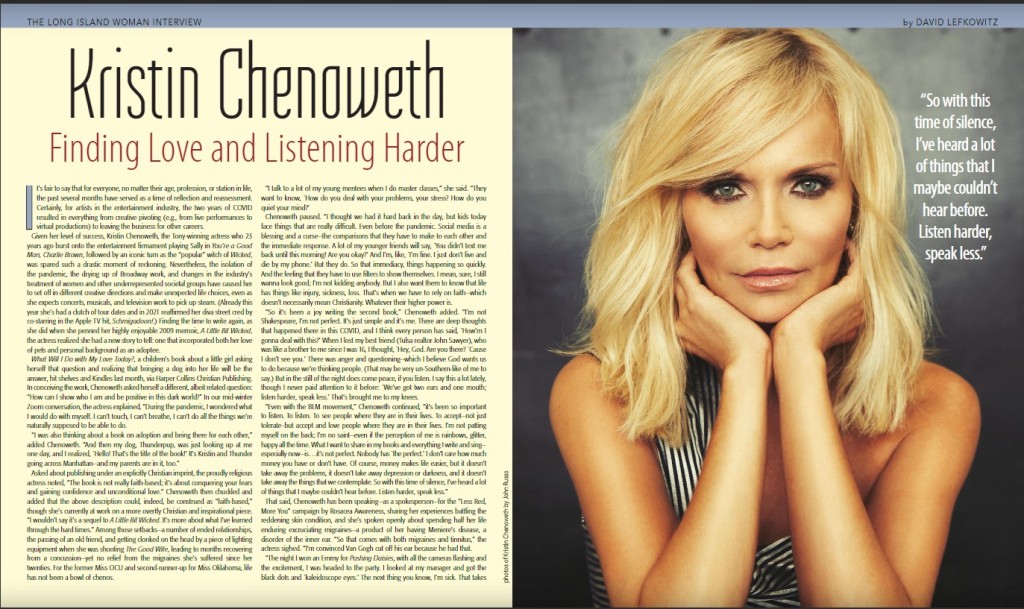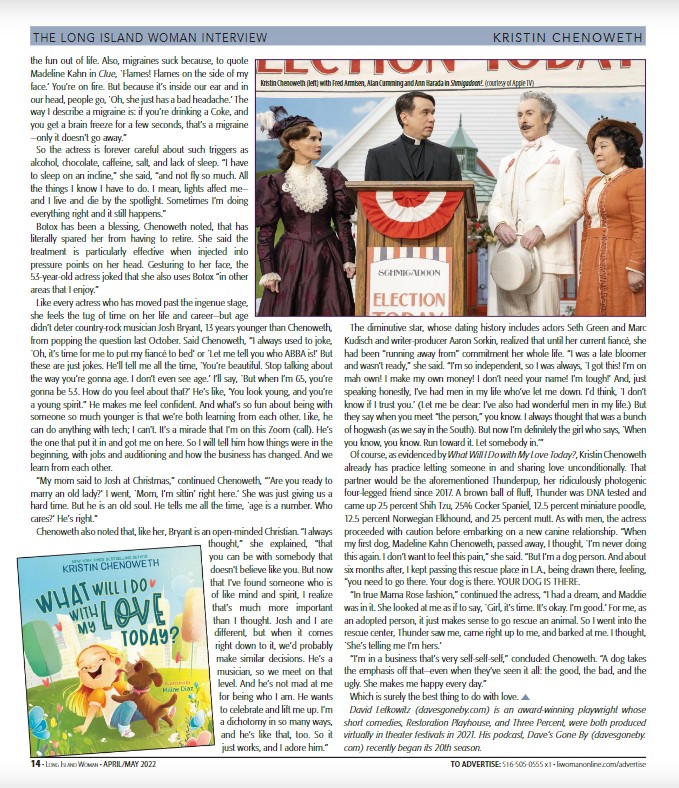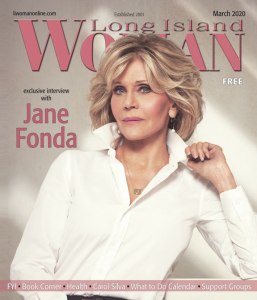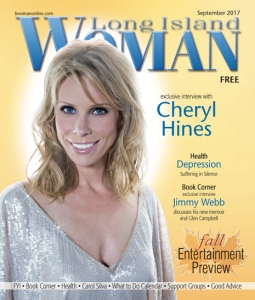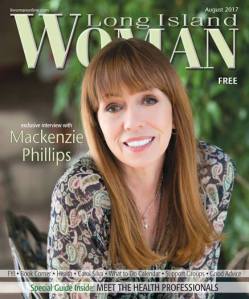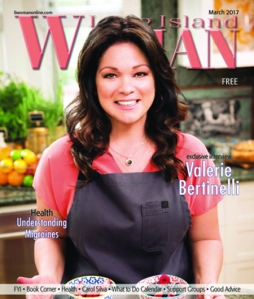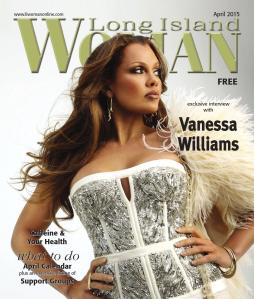LONG ISLAND WOMAN INTERVIEW – Kristin Chenoweth
Exclusive Interview with Kristin Chenoweth: Finding Love and Listening Harder
by David Lefkowitz
((c)2022 David Lefkowitz. This profile was first published in the April/May 2022 issue of Long Island Woman magazine)
It’s fair to say that for everyone, no matter their age, profession, or station in life, the past several months have served as a time of reflection and reassessment. Certainly, for artists in the entertainment industry, the two years of COVID resulted in everything from creative pivoting (e.g., from live performances to virtual productions) to leaving the business for other careers.
Given her level of success, Kristin Chenoweth, the Tony-winning actress who 23 years ago burst onto the entertainment firmament playing Sally in You’re a Good Man, Charlie Brown, followed by an iconic turn as the “popular” witch of Wicked, was spared such a drastic moment of reckoning. Nevertheless, the isolation of the pandemic, the drying up of Broadway work, and changes in the industry’s treatment of women and other underrepresented societal groups have caused her to set off in different creative directions and make unexpected life choices, even as she expects concerts, musicals, and television work to pick up steam. (Already this year she’s had a clutch of tour dates and in 2021 reaffirmed her diva street cred by co-starring in the Apple TV hit, Schmigadoon!.) Finding the time to write again, as she did when she penned her highly enjoyable 2009 memoir, A Little Bit Wicked, the actress realized she had a new story to tell: one that incorporated both her love of pets and personal background as an adoptee.
What Will I Do with My Love Today?, a children’s book about a little girl asking herself that question and realizing that bringing a dog into her life will be the answer, hit shelves and Kindles last month, via Harper Collins Christian Publishing. In conceiving the work, Chenoweth asked herself a different, albeit related question: “How can I show who I am and be positive in this dark world?” In our mid-winter Zoom conversation, the actress explained, “During the pandemic, I wondered what I would do with myself. I can’t touch, I can’t breathe, I can’t do all the things we’re naturally supposed to be able to do.
“I was also thinking about a book on adoption and being there for each other,” added Chenoweth. “And then my dog, Thunderpup, was just looking up at me one day, and I realized, `Hello! That’s the title of the book!’ It’s Kristin and Thunder going across Manhattan — and my parents are in it, too.”
Asked about publishing under an explicitly Christian imprint, the proudly religious actress noted, “The book is not really faith-based; it’s about conquering your fears and gaining confidence and unconditional love.” Chenoweth then chuckled and added that the above description could, indeed, be construed as “faith-based,” though she’s currently at work on a more overtly Christian and inspirational piece. “I wouldn’t say it’s a sequel to A Little Bit Wicked. It’s more about what I’ve learned through the hard times.” Among those setbacks — a number of ended relationships, the passing of an old friend, and getting clonked on the head by a piece of lighting equipment when she was shooting The Good Wife, leading to months recovering from a concussion — yet no relief from the migraines she’s suffered since her twenties. For the former Miss OCU and second-runner-up for Miss Oklahoma, life has not been a bowl of chenos.
“I talk to a lot of my young mentees when I do master classes,” she said. “They want to know, `How do you deal with your problems, your stress? How do you quiet your mind?’
Chenoweth paused. “I thought we had it hard back in the day, but kids today face things that are really difficult. Even before the pandemic. Social media is a blessing and a curse — the comparisons that they have to make to each other and the immediate response. A lot of my younger friends will say, `You didn’t text me back until this morning! Are you okay?’ And I’m, like, `I’m fine. I just don’t live and die by my phone.’ But they do. So that immediacy, things happening so quickly. And the feeling that they have to use filters to show themselves. I mean, sure, I still wanna look good; I’m not kidding anybody. But I also want them to know that life has things like injury, sickness, loss. That’s when we have to rely on faith — which doesn’t necessarily mean Christianity. Whatever their higher power is.
“So it’s been a joy writing the second book,” Chenoweth added. “I’m not Shakespeare, I’m not perfect. It’s just simple and it’s me. There are deep thoughts that happened there in this COVID, and I think every person has said, `How’m I gonna deal with this?’ When I lost my best friend [Tulsa realtor John Sawyer], who was like a brother to me since I was 16, I thought, `Hey, God. Are you there? `Cause I don’t see you.’ There was anger and questioning — which I believe God wants us to do because we’re thinking people. (That may be very un-Southern-like of me to say.) But in the still of the night does come peace, if you listen. I say this a lot lately, though I never paid attention to it before: `We’ve got two ears and one mouth; listen harder, speak less.’ That’s brought me to my knees.
“Even with the BLM movement,” Chenoweth continued, “it’s been so important to listen. To listen. To see people where they are in their lives. To accept — not just tolerate but accept and love people where they are in their lives. I’m not patting myself on the back; I’m no saint — even if the perception of me is rainbows, glitter, happy all the time. What I want to share in my books and everything I write and sing — especially now — is…it’s not perfect. Nobody has `the perfect.’ I don’t care how much money you have or don’t have. Of course money makes life easier, but it doesn’t take away the problems, it doesn’t take away depression or darkness, and it doesn’t take away the things that we contemplate. So with this time of silence, I’ve heard a lot of things that I maybe couldn’t hear before. Listen harder, speak less.”
That said, Chenoweth has been speaking — as a spokesperson — for the “Less Red, More You” campaign by Rosacea Awareness, sharing her experiences battling the reddening skin condition, and she’s spoken openly about spending half her life enduring excruciating migraines — a product of her having Meniere’s disease, a disorder of the inner ear. “So that comes with both migraines and tinnitus,” the actress sighed. “I’m convinced Van Gogh cut off his ear because he had that.
“The night I won an Emmy for Pushing Daisies, with all the cameras flashing and the excitement, I was headed to the party. I looked at my manager and got the black dots and `kaleidoscope eyes.’ The next thing you know, I’m sick. That takes the fun out of life. Also, migraines suck because, to quote Madeline Kahn in Clue, `Flames! Flames on the side of my face.’ You’re on fire. But because it’s inside our ear and in our head, people go, `Oh, she just has a bad headache.’ The way I describe a migraine is: if you’re drinking a Coke, and you get a brain freeze for a few seconds, that’s a migraine — only it doesn’t go away.”
So the actress is forever careful about such triggers as alcohol, chocolate, caffeine, salt, and lack of sleep. “I have to sleep on an incline,” she said, “and not fly so much. All the things i know I have to do. I mean, lights affect me — and I live and die by the spotlight. Sometimes I’m doing everything right and it still happens.”
Botox has been a blessing, Chenoweth noted, that has literally spared her from having to retire. She said the treatment is particularly effective when injected into pressure points on her head. Gesturing to her face, the 53-year-old actress joked that she also uses Botox “in other areas that I enjoy.”
Like every actress who has moved past the ingenue stage, Chenoweth feels the tug of time on her life and career — but age didn’t deter country-rock musician Josh Bryant, 13 years her senior, from popping the question last October. Said Chenoweth, “I always used to joke, `Oh, it’s time for me to put my fiancé to bed’ or `Let me tell you who ABBA is!’ But these are just jokes. He’ll tell me all the time, `You’re beautiful. Stop talking about the way you’re gonna age. I don’t even see age.’ I’ll say, `But when I’m 65, you’re gonna be 53. How do you feel about that?’ He’s like, ’You look young, and you’re a young spirit.” He makes me feel confident. And what’s so fun about being with someone so much younger is that we’re both learning from each other. Like, he can do anything with tech; I can’t. It’s a miracle that I’m on this Zoom [call]. He’s the one that put it in and got me on here. So I will tell him how things were in the beginning, with jobs and auditioning and how the business has changed. And we learn from each other.
“My mom said to Josh at Christmas,” continued Chenoweth, “‘Are you ready to marry an old lady?’ I went, `Mom, I’m sittin’ right here.’ She was just giving us a hard time. But he is an old soul. He tells me all the time, `age is a number. Who cares?’ He’s right.”
Chenoweth also noted that, like her, Bryant is an open-minded Christian. “I always thought,” she explained, “that you can be with somebody that doesn’t believe like you. But now that I’ve found someone who is of like mind and spirit, I realize that’s much more important than I thought. Josh and I are different, but when it comes right down to it, we’d probably make similar decisions. He’s a musician, so we meet on that level. And he’s not mad at me for being who I am. He wants to celebrate and lift me up. I’m a dichotomy in so many ways, and he’s like that, too. So it just works, and I adore him.”
The diminutive star, whose dating history includes actors Seth Green and Marc Kudisch and writer-producer Aaron Sorkin, realized that until her current fiancé, she had been “running away from” commitment her whole life. “I was a late bloomer and wasn’t ready,” she said. “I’m so independent, so I was always, `I got this! I’m on mah own! I make my own money! I don’t need your name! I’m tough!’ And, just speaking honestly, I’ve had men in my life who’ve let me down. I’d think, `I don’t know if I trust you.’ (Let me be clear: I’ve also had wonderful men in my life.) But they say when you meet “the person,” you know. I always thought that was a bunch of hogwash (as we say in the South). But now I’m definitely the girl who says, `When you know, you know. Run toward it. Let somebody in.’”
Of course, as evidenced by What Will I Do with My Love Today?, Kristin Chenoweth already has practice letting someone in and sharing love unconditionally. That partner would be the aforementioned Thunderpup, her ridiculously photogenic four-legged friend since 2017. A brown ball of fluff, Thunder was DNA tested and came up 25 percent Shih Tzu, 25% Cocker Spaniel, 12.5 percent miniature poodle, 12.5 percent Norwegian Elkhound, and 25 percent mutt. As with men, the actress proceeded with caution before embarking on a new canine relationship. “When my first dog, Madeline Kahn Chenoweth, passed away, I thought, `I’m never doing this again. I don’t want to feel this pain,” she said. “But I’m a dog person. And about six months after, I kept passing this rescue place in L.A., being drawn there, feeling, `you need to go there. Your dog is there. YOUR DOG IS THERE.’
“In true Mama Rose fashion,” continued the actress, “I had a dream, and Maddie was in it. She looked at me as if to say, `Girl, it’s time. It’s okay. I’m good.’ For me, as an adopted person, it just makes sense to go rescue an animal. So I went into the rescue center, Thunder saw me, came right up to me, and barked at me. I thought, `She’s telling me I’m hers.’
“I’m in a business that’s very self-self-self,” concluded Chenoweth. “A dog takes the emphasis off that — even when they’ve seen it all: the good, the bad, and the ugly. She makes me happy every day.”
Which is surely the best thing to do with love.
********************
SIDEBAR:
CHATTING WITH CHENO
So have you and Josh set a date?
We kind of go back and forth, but don’t be surprised if we just run off and do it.
Do you and he fight over the remote?
He’s learned not to fight with me. And he’s now a fan of all the Housewives. Plus we binge shows like Ozark and watch every single documentary, from true crime to David Foster.
What book are you reading?
I’m in the middle of The Sleep Fix (by Diane Macedo). Director Richard Jay-Alexander sent me the book because besides migraines, I have insomnia. I’ve taken all the natural herbs I can. I’ve taken Ambien. So I don’t know if the book is going to help — you know, “turn off your phone, don’t lie in bed and watch TV” — that stuff.
Do you have a favorite joke?
The famous thing about me is that I love comedy, but I am the worst joke teller. I mean, I’ll screw up, `Knock knock. Who’s there? Olive you. Olive who…’ See? I screwed it up. I DON’T TELL JOKES.
Favorite biblical quotation?
From Proverbs: “Seek and you shall find. Knock and the door will open.” It’s a lesson in patience.
Favorite Painter?
Edgar Degas. Especially his ballet dancers. That era, and the use of color.
If you could have dinner with any historical personage — besides Jesus — it would be…?
Leonard Bernstein. The Maestro himself.
*
BYLINE:
David Lefkowitz is an award-winning playwright whose short comedies, Restoration Playhouse, and Three Percent, were both produced virtually in theater festivals in 2021. His podcast, Dave’s Gone By (davesgoneby.com) recently began its 20th season.
